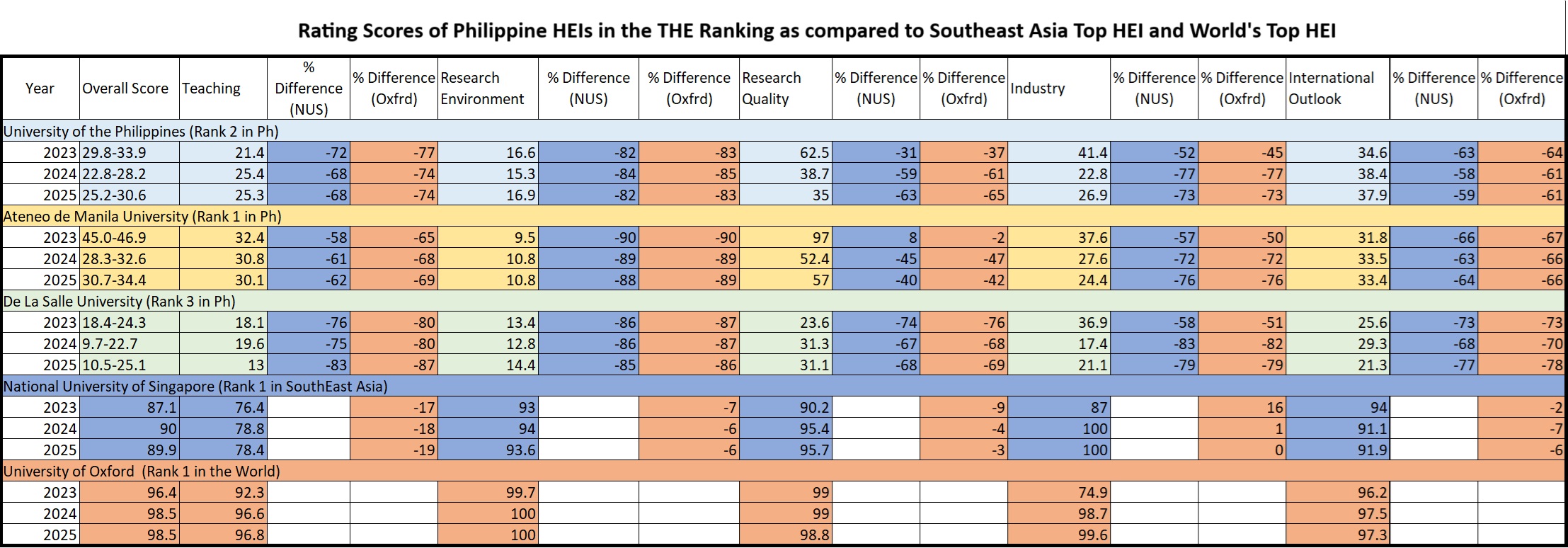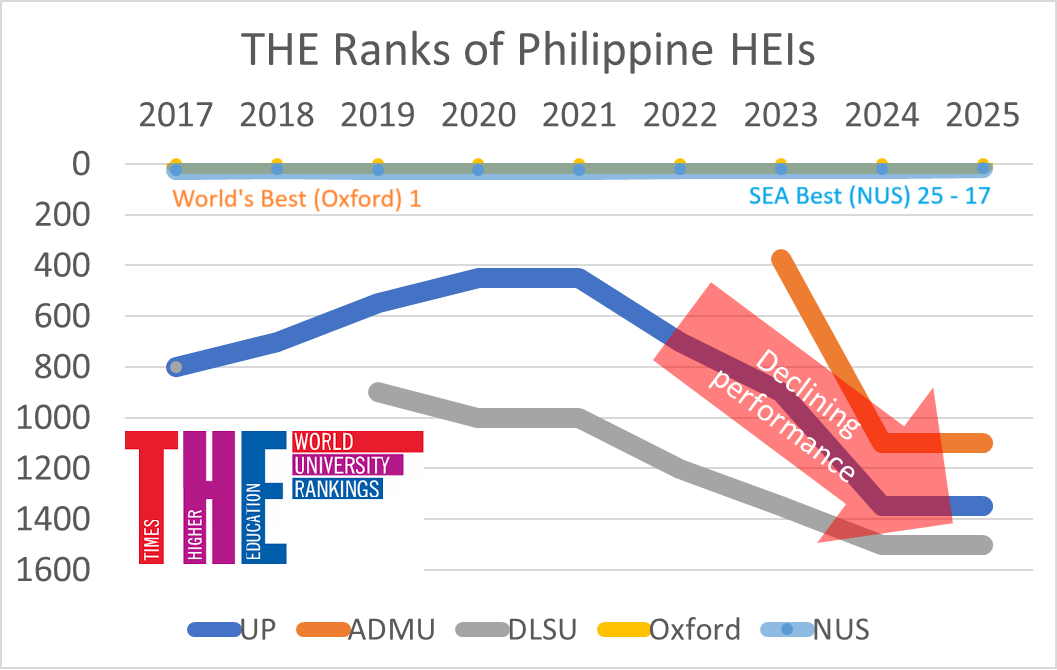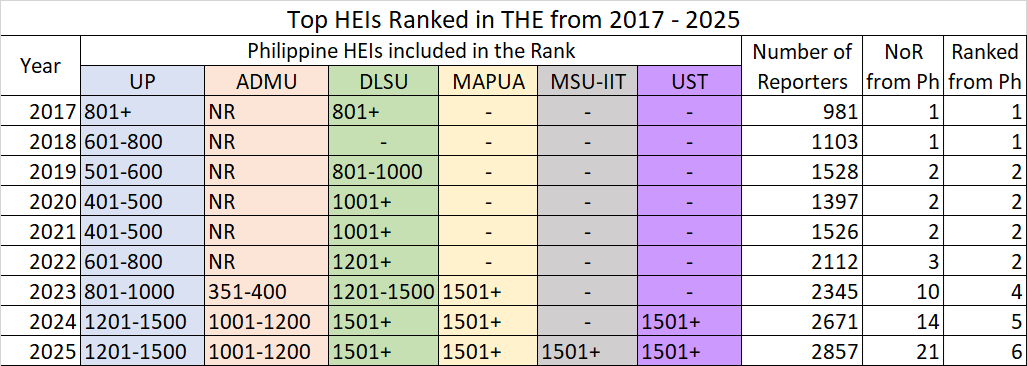Reforming Philippine Universities: Addressing Poor Performance and Overcoming Systemic Challenges in Higher Education
 While there have been an increase of Philippine HEIs in the ranking, their position has declined since then. As shown in the figures, the global competitiveness of Philippine universities has been steadily declining, as evidenced by their performances in the Times Higher Education World University Rankings (THE WUR). Top institutions such as the University of the Philippines (UP), Ateneo de Manila University (ADMU), and De La Salle University (DLSU) have shown consistently low scores in areas like faculty, research environment, industry collaboration, and international outlook.
While there have been an increase of Philippine HEIs in the ranking, their position has declined since then. As shown in the figures, the global competitiveness of Philippine universities has been steadily declining, as evidenced by their performances in the Times Higher Education World University Rankings (THE WUR). Top institutions such as the University of the Philippines (UP), Ateneo de Manila University (ADMU), and De La Salle University (DLSU) have shown consistently low scores in areas like faculty, research environment, industry collaboration, and international outlook.
This article critically examines these challenges and presents solutions, incorporating the insights of Amanda Goodall and Jamil Salmi on what makes world-class universities.
Dismal Research Environment and Lack of R&D Investment
One of the most pressing issues facing Philippine universities is the poor state of their research environments. UP, for example, recorded scores between 15.3 and 16.9 in research-related categories from 2023 to 2025, in stark contrast to institutions like the University of Oxford and the National University of Singapore (NUS), which score above 90. The primary cause of this underperformance is limited government spending on research and development (R&D). In the Philippines, only a small portion of the national budget is allocated to research, leaving universities without the resources necessary for high-impact studies. While the funds for R and D has increased, it is still too low.
Even when universities like UP receive significant R&D funding, bureaucratic red tape, defective procurement policies and other restrictions s
low down the disbursement of funds, preventing timely research activities and the acquisition of essential equipment. Jamil Salmi, in his work "The Challenge of Establishing World-Class Universities," highlights the importance of abundant resources for successful research. Without sustained and efficient financial support, Philippine universities are unable to compete with their global counterparts. Potential source of R and D fund is the industry, but this partnership is poor as well.
Politicized Leadership and Governance
Philippine higher education institutions are highly politicized, with university leadership often chosen based on political affiliations rather than academic qualifications or research credentials. This practice undermines efforts to prioritize research and innovation. Amanda Goodall’s research in "Socrates in the Boardroom" emphasizes that universities thrive when led by scholar-leaders who understand and prioritize academic values, research, and innovation. Without academic leaders who have a strong background in research, Philippine HEIs struggle to implement policies that would enhance R&D, further weakening their global standing.
In the study "Is Socrates in the Boardroom of Philippine HEIs?" echoes these concerns, revealing how leaders with little academic or research experience hold decision-making power, hampering university growth. For HEIs to thrive, governance should focus on merit-based leadership that values knowledge creation, aligning with Salmi's assertion that favorable governance is one of the pillars of a world-class university.
Poor Industry Collaboration
Philippine universities also perform poorly in industry collaboration, with DLSU, for example, dropping from a score of 36.9 in 2023 to 21.1 in 2025. This limited engagement between academia and industry may stems from low trust of the industry to the academia. Many reports shared that graduated lack industry readiness. This can be attributed to a defective licensing system that emphasizes licensure exam pass rates over developing industry-relevant skills. Many HEIs especially in the countryside has no Industries where people in the academe engage. Reports also show that the academic personnel has low engagement in R&D and industry experiences limiting further the potential to interact with them. Many academic personnel enters the academe with low to nothing industry experience, with not so attractive compensation, many professionals with ideal qualifications are not attracted to enter the academe. This dirth in qualified professionals led to hiring fresh graduates, mostly with not industry or limited industry experience. As Jamil Salmi points out, concentration of talent and strong ties with industries are crucial for a university to excel globally.
Many graduates in the Philippines, although capable of passing licensure exams, lack the practical skills and creativity needed by industries. This discourages industry partners from engaging with universities, widening the gap between academia and industry. Furthermore, restrictive procurement processes and too many requirements to engage with the industry hinder universities from forming timely partnerships with industries, further diminishing research output and innovation.
Restrictive Teaching Practices and Outdated Curricula
Philippine universities continue to rely on outdated teaching methods that emphasize theoretical knowledge over practical skills. The strict policies of CHED encourages in school training rather than industry field activities. Most academic programs focus is on licensure exams that promotes rote memorization rather than critical thinking and innovation. According to Amanda Goodall, universities need to foster an academic environment that encourages inquiry and innovation, which is stifled under current regulations.
CHED’s regulatory framework also restricts the flexibility needed to adopt modern pedagogies and innovative curricula. In contrast, universities in countries like Singapore and the UK have invested heavily in teaching innovation, incorporating research-based education and blended learning. Until Philippine HEIs are allowed more flexibility to modernize their teaching practices, they will continue to lag behind in global competitiveness.
International Outlook and Global Competitiveness
The international outlook of Philippine universities remains weak, with UP, ADMU, and DLSU scoring between 25.6 and 37.9 in recent years. Internationalization is a key element for world-class universities, as highlighted by both Goodall and Salmi. However, Philippine universities suffer from limited recruitment of international faculty, low international student enrollment, and weak research collaborations.
International students often choose universities with strong global reputations. When rankings are low, Philippine institutions struggle to attract diverse international students, except for those seeking low tuition fees. Government policies, such as strict visa regulations and bureaucratic delays, further hinder efforts to boost international engagement.
The Defective Basic Education System and Its Impact on HEIs
Another major issue is the poor preparation of students entering universities. The Philippines consistently performs poorly in international assessments like PISA, particularly in critical areas like math, science, and reading comprehension. This leaves universities investing substantial resources in remedial education, detracting from higher-level research and innovation.
As Salmi points out, world-class universities require a concentration of talent. In the Philippines, this talent pipeline is severely compromised by an ineffective basic education system that does not prepare students to succeed in higher education or as professionals.
The Educational Commission formed by the Philippines Congress have identified the need for systemic overhaul. This observation actually is also true in the higher education institutions.
CHED's Role in Perpetuating Poor Performance
CHED plays a crucial role in shaping higher education policy, but its current approach perpetuates systemic problems. The focus on licensure exam pass rates as a measure of quality promotes an exam-oriented culture, which hinders broader learning and innovation. CHED’s rigid regulations also stifle efforts to foster research excellence and international collaboration. There is also the accreditation system that focuses more on not too important indicators. The way ISO is also practiced in many HEIs are to a certain extent defective with people not fully understanding the ideals of the system.
For Philippine universities to thrive, CHED must shift from simply regulating institutions to actively supporting innovation, internationalization, and R&D initiatives, as Salmi advocates for in his framework for world-class universities.
What Can Be Done?
To address these challenges, the government, CHED, and university leaders must initiate comprehensive reforms:
Increased R&D Investment: The government should significantly increase R&D funding and streamline procurement processes, enabling universities to conduct impactful research. Salmi stresses that abundant resources are essential for universities aiming to achieve global excellence.
Reform of the Licensing System: Reducing the focus on licensure exams and emphasizing real-world skills and innovation will better prepare students for industry demands. Universities should focus on hands-on learning, interdisciplinary projects, and internships, as both Goodall and Salmi argue for practical skill development over rote learning.
Promoting Industry-Academia Collaboration: Simplifying procurement processes and offering incentives for industry collaboration are key to fostering meaningful partnerships. Goodall emphasizes the importance of scholar-leaders who understand the academic and industry needs to drive innovation.
Modernizing Teaching Practices: CHED should encourage flexibility in curriculum development, promoting critical thinking and problem-solving over rote memorization. Universities should be allowed to experiment with modern teaching methods, fostering an environment of inquiry and innovation, as both Goodall and Salmi suggest.
Strengthening Internationalization Efforts: Philippine universities should actively recruit international faculty, establish global research partnerships, and promote student exchange programs. Goodall's and Salmi’s works both highlight that internationalization is essential for raising a university’s global standing.
Overhauling Basic Education: The government must reform the basic education system to better prepare students for higher education. By improving critical thinking and foundational skills early on, universities will receive better-prepared students who can contribute meaningfully to research and innovation.
Improving University Governance: Inspired by Goodall's research, Philippine universities need to prioritize merit-based leadership, appointing scholar-leaders with a strong academic and research background. Salmi also emphasizes that favorable governance is essential for creating a world-class institution.


The systemic issues in Philippine higher education—insufficient research funding, outdated curricula, poor industry collaboration, and inefficient governance—are reflected in the poor rankings of the country’s universities. Amanda Goodall’s work highlights the need for scholar-leaders who value research and academic freedom, while Jamil Salmi’s framework emphasizes the importance of resources, talent, and governance. To truly compete globally, Philippine universities must reform their leadership, focus on R&D, and embrace international collaboration. Only through these changes can they climb the global rankings and realize their potential as centers of innovation and knowledge creation.
The systemic issues in Philippine higher education—insufficient research funding, outdated curricula, poor industry collaboration, and inefficient governance—are reflected in the poor rankings of the country’s universities. Amanda Goodall’s work highlights the need for scholar-leaders who value research and academic freedom, while Jamil Salmi’s framework emphasizes the importance of resources, talent, and governance. To truly compete globally, Philippine universities must reform their leadership, focus on R&D, and embrace international collaboration. Only through these changes can they climb the global rankings and realize their potential as centers of innovation and knowledge creation.
